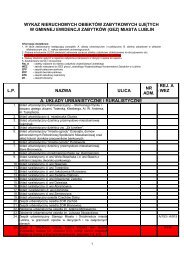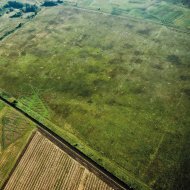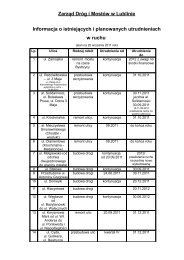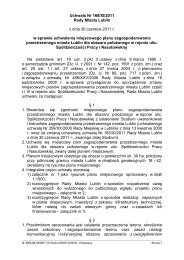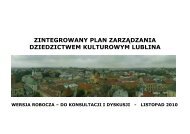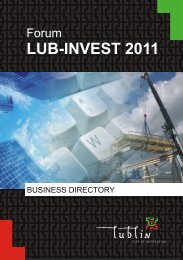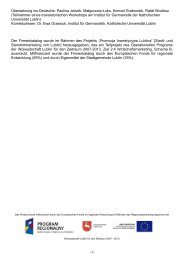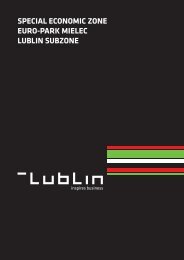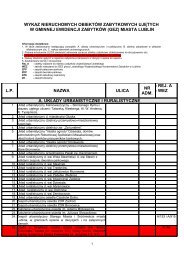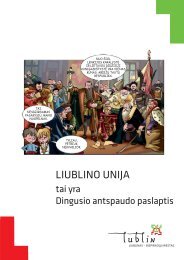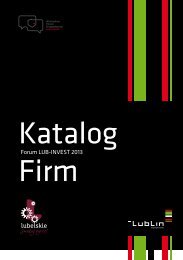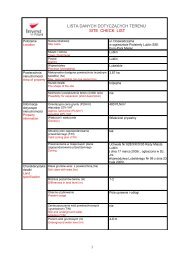The URBACT II Programme 2007 - 2013 - Lublin
The URBACT II Programme 2007 - 2013 - Lublin
The URBACT II Programme 2007 - 2013 - Lublin
Create successful ePaper yourself
Turn your PDF publications into a flip-book with our unique Google optimized e-Paper software.
Final Application Form TN <strong>URBACT</strong> <strong>II</strong><br />
tended agora for City affairs.<br />
<strong>The</strong> process map to deliver the<br />
actions for the LSG follow a<br />
stepped approach with a declaration<br />
of interest from the Valletta<br />
LC part approved by the<br />
targeted stakeholders. <strong>The</strong><br />
stakeholders will be assembled<br />
and the process of meetings<br />
formalized on a committee<br />
level. <strong>The</strong> LSG will consider the<br />
milestones of the project and<br />
will establish a process map to<br />
carry out the tasks in line with<br />
the project definitions.<br />
4.2 Integration of ULSG activities to project work programme<br />
<strong>The</strong> involvement of relevant partners at local level is a core component of the UR-<br />
BACT <strong>II</strong> methodology for enhancing urban sustainable development policies.<br />
In order to allow for an effective impact of network activities on local policies, each<br />
partner in the thematic network HerO will set up an <strong>URBACT</strong> Local Support Group<br />
by inviting the local key stakeholders concerned with regards to the integrated<br />
management of the historic urban landscape. This aims to balance and co-ordinate<br />
the different demands and interests on the old town area and to support a sustainable,<br />
future-oriented urban development, which combines the preservation of the<br />
cultural heritage assets with the necessary economic growth.<br />
With this integrated approach, the <strong>URBACT</strong> Local Support Group of each partner<br />
city wil conjointly develop a Local Action Plan, which in our case is a “road map”<br />
for the development and implementation of an “Integrated Cultural Heritage Management<br />
Plan”.<strong>The</strong> Local Action Plans will be developed on the basis of the input<br />
given on project level during the 1 st and 2 nd thematic meeting, whereas the 3 rd and<br />
4 th thematic meeting offer a platform to discuss the (draft) LAPs in a peer review<br />
together with the other project partners, the associated Managing Authorities, the<br />
European Commission, the European Association of Historic Towns and Regions,<br />
the Lead Expert and other external experts. Within the HerO project work, a strong<br />
link between the local and the project level is therefore guaranteed.<br />
But not only the LAPs and the approach of implementing “Integrated Cultural Heritage<br />
Management Plans” in the HerO partner cities wil link the ULSGs’ work to the<br />
project activities. <strong>The</strong> selected topics for further exchange and learning activities<br />
“Visual Integrity” and “Balanced urban functions in historic urban landscapes” (as<br />
conjointly defined by the partners as being the most relevant in terms of the sustainable<br />
management of the historic urban landscape) are of great importance and<br />
an integral part of the daily work of most ULSG members who deal with managing<br />
an old town area. <strong>The</strong> involvement and the active participation of individual ULSG<br />
members in the related expert workshops are highly desirable as external views<br />
will add additional value to the exchange activities.<br />
<strong>The</strong> members of the partner’s <strong>URBACT</strong> Local Support Groups are explicitly invited<br />
42




